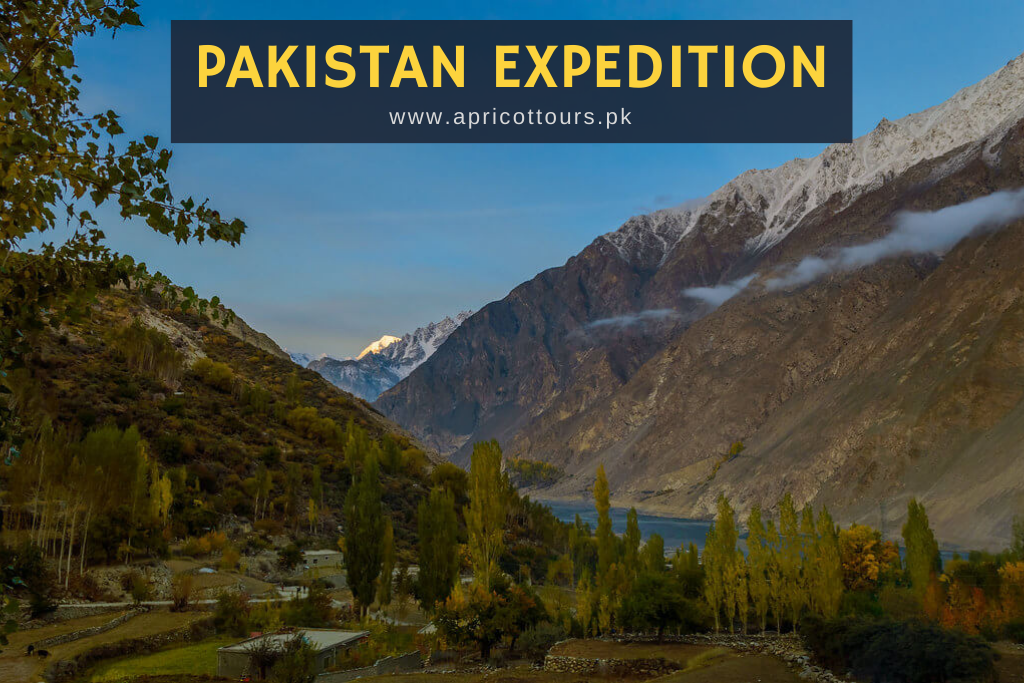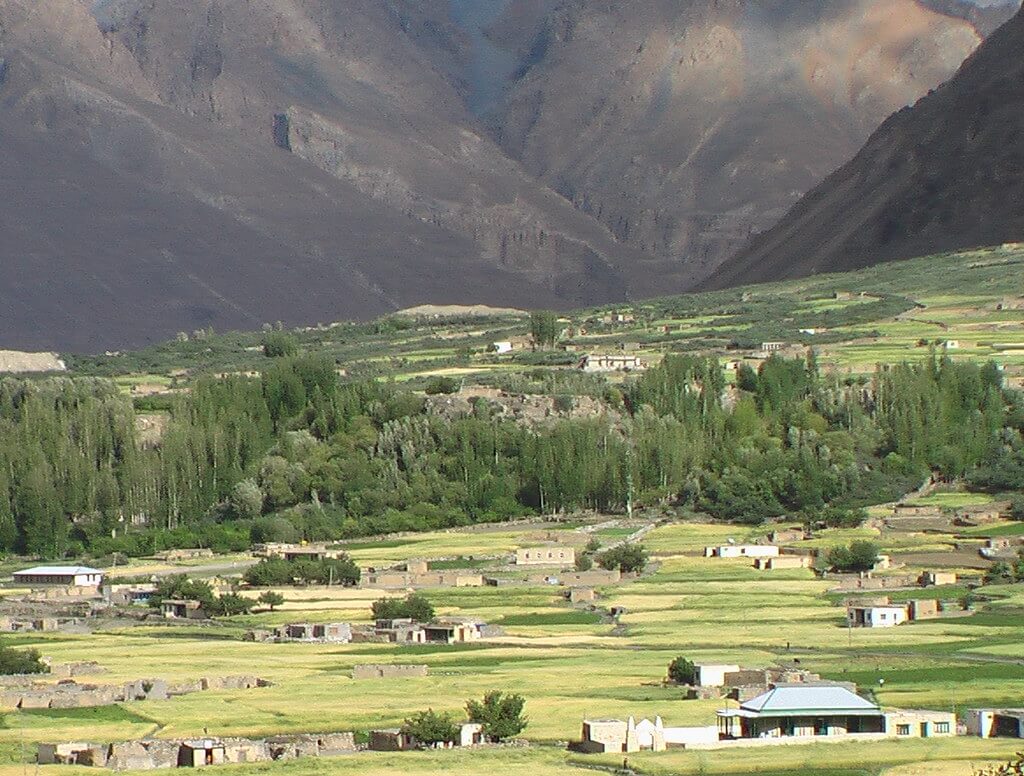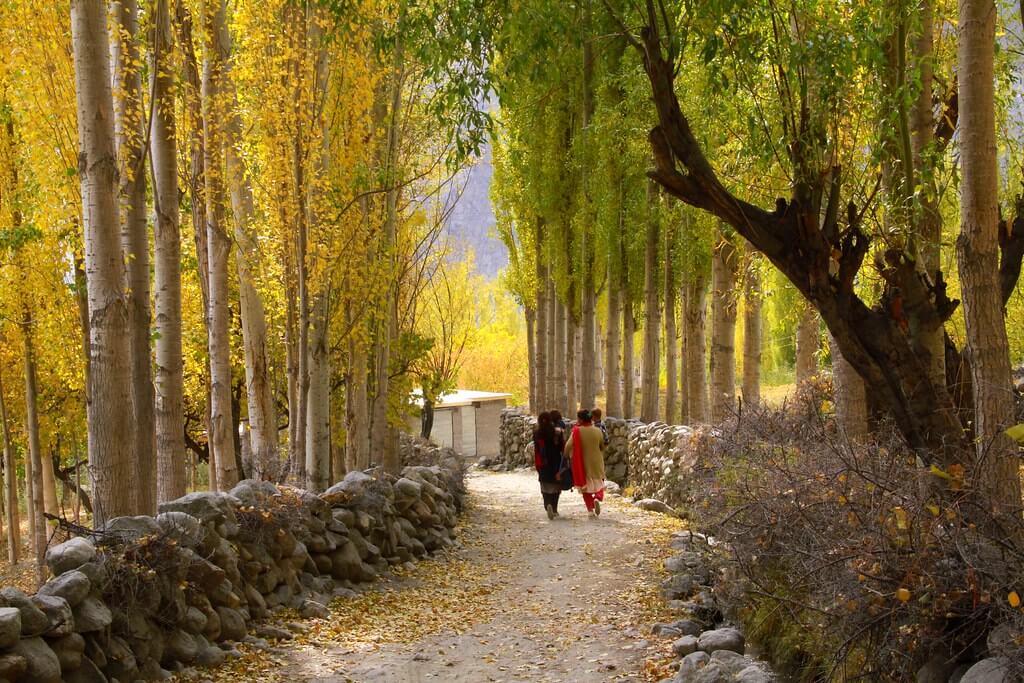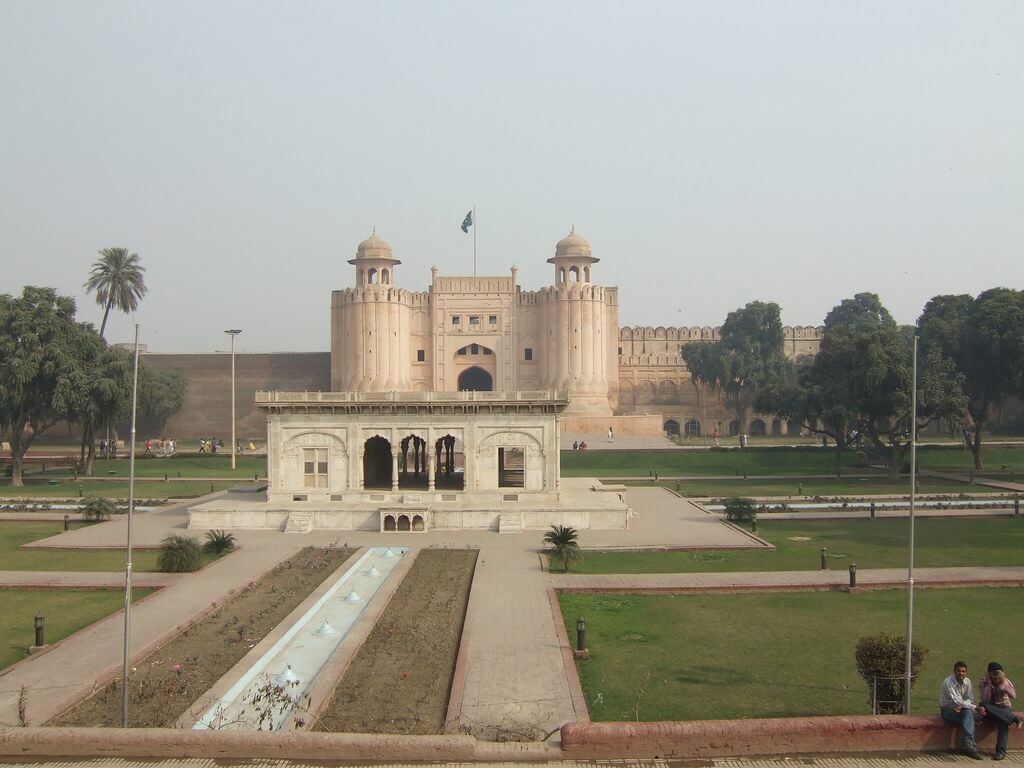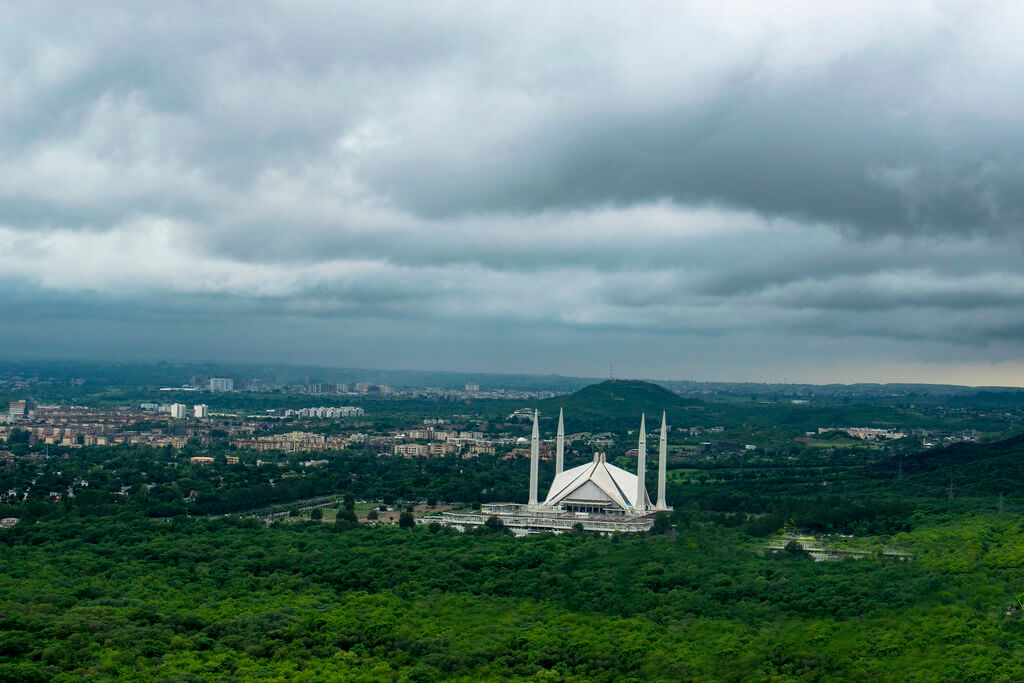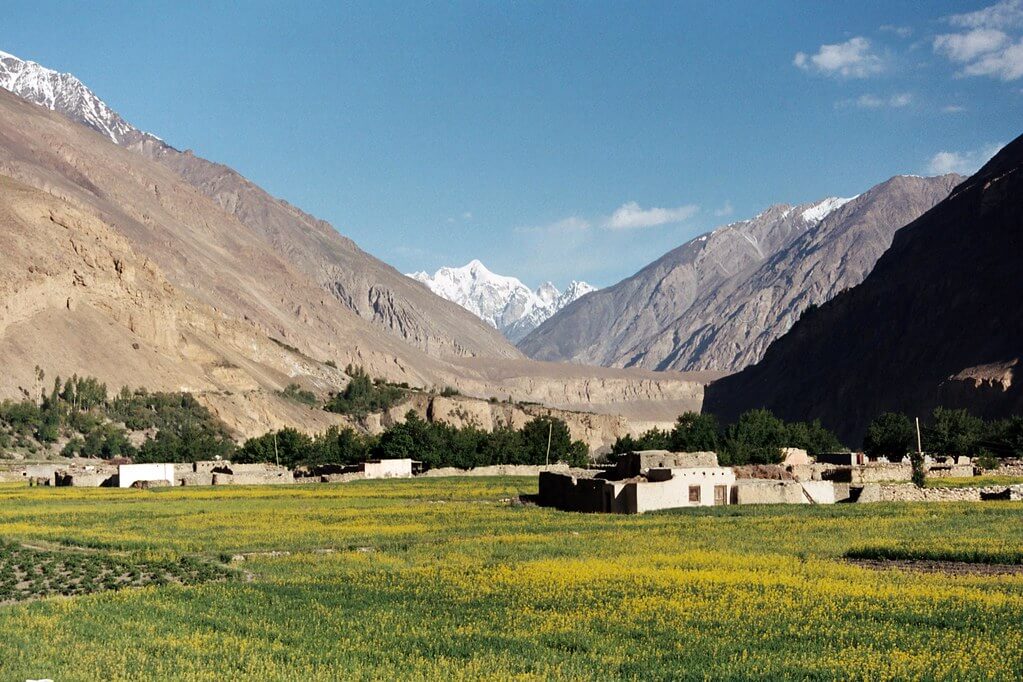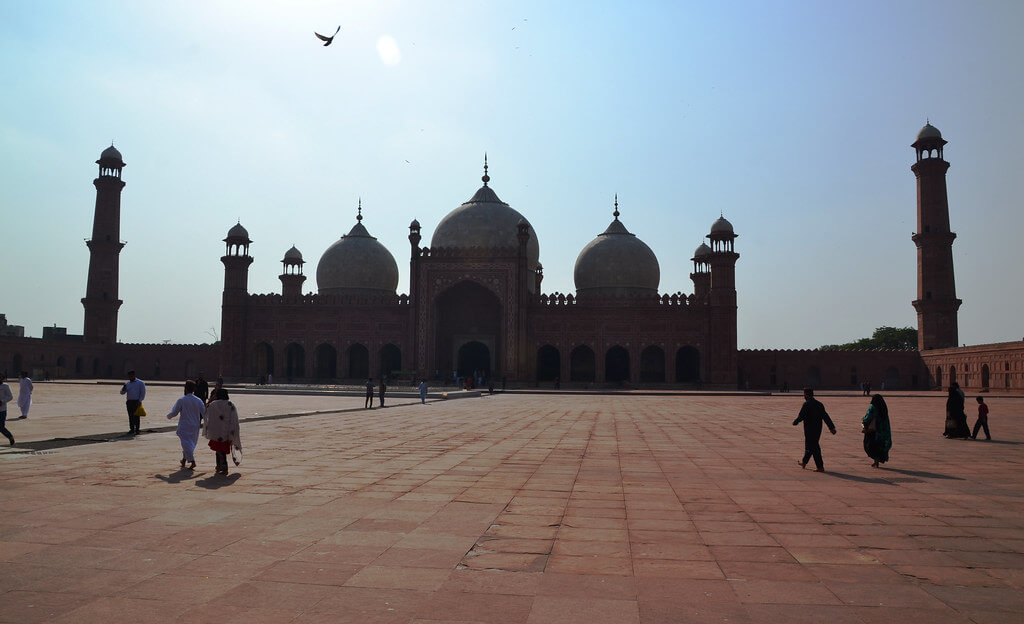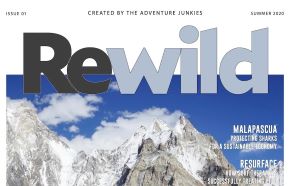General
Pakistan Expedition (2024-25) – 15 Days
Pakistan Expedition is a first-time journey in a remote region. The journey departs from Islamabad, the capital of Pakistan, and travels north to the gorgeous but under-visited Hunza Valley region. Nature has been allowed to run wild here; picture imposing jagged peaks, alpine lakes, and glaciers seeping into valleys. Learn about the contemporary improvements that support the prosperity of the locals as you walk between historic fortifications spread around rural hamlets. Finish in Lahore, a city that has endured the rise and fall of numerous dynasties while also preserving the culture that has made Pakistan such a captivating and all-consuming place.
Dates & Cost – Pakistan Expedition – (15 Days)
Summers are considered the best expedition season in Pakistan’s Himalayan and Karakoram regions. Considering the flow of tourists and demand for the Pakistan Expedition, we carefully chose our dates for this Expedition. The start and end dates in the table below are your dates of arrival and departure from Pakistan. We have at least 2 guaranteed departures every year. Our dates and costs for the Expedition are given below.
| Start Dates | End Dates | Price (USD) | Availability | Deposit | Registration |
|---|---|---|---|---|---|
| 25-May-2025 | 08-Jun-2025 | US$ 4,800 | Limited Space | US$ 260 | BOOK NOW |
| 27-Sep-2025 | 11-Oct-2025 | US$ 4,800 | Available | US$ 260 | BOOK NOW |
| Start Dates | End Dates | Price (USD) | Availability | Deposit | Registration |
Holiday Information
Foreign travelers (non-Pakistani)
- Implementation of Covid SOPs/Guidelines & Complimentary Safety Pack (sanitizer, 1 mask & glove per day)
- Licensed professional guide (government requirement)
- Airport transfer on the first and last day in Islamabad
- All domestic road transfers
- All hotel accommodations (twin-sharing rooms)
- All camping accommodation (twin sharing dome tents)
- All hotel meals (breakfast, lunch and dinner)
- All trekking meals (breakfast, lunch and dinner)
- All camping site fees
- Trekking logistics (tents, non-personal equipments and tools)
- Support staff (cook, assistant(s) etc)
- Porters for trekking equipments, kitchen (supplies, tools, equipments, crockery, gas) and personal luggage (12.5kg)
Domestic travelers (Pakistani Nationals)
- Licensed professional guide
- Road transport (Islamabad to Islamabad)
- Hotel accommodation according to itinerary
- Hotel meals according to itinerary
- All camping accommodation (twin sharing dome tents)
- All camping meals (breakfast, lunch and dinner)
- All camping site fees
- Trekking logistics (kitchen tents, non-personal equipments and tools)
- Support staff (cook, assistant(s) etc – according to need)
- Porters for trekking equipments and kitchen (supplies, tools, equipments, crockery, gas)
Foreign travelers (non-Pakistani)
- Travel Insurance (recommendations only)
- Visa to Pakistan (supporting documents will be offered)
- International airfare
- Personal equipment (warm clothes, hiking boots, etc)
- Tips for guides, porters, staff, etc
- Miscellaneous (drinks, phone calls, laundry, souvenir etc)
Domestic travelers (Pakistani Nationals)
- Airport transfers in Islamabad (can be arranged – additional charges)
- Sightseeing in Islamabad and surrounding areas (can be arranged – additional charges)
- Hotel accommodation in Islamabad (can be arranged – additional charges)
- Hotel meals in Islamabad (can be arranged – additional charges)
- Travel insurance (recommendations can be requested)
- Visa to Pakistan (not required)
- International airfare for overseas Pakistani
- Personal equipments (warm clothes, hiking boots etc)
- Porters for personal luggage (can be arranged – additional charges)
- Tips for guides, porters, staff etc
- Miscellaneous (drinks, phone calls, laundry, souvenir etc)
Highlights – Pakistan Expedition
Pakistan Expedition has a lot to offer. Given below are the main highlights of the Expedition
- Explore Gulmit
- Shimshal Valley
- Opportunity to meet local Families in Shimshal
- Bonfires and music at base camp
- Tatu Jeep Safari - ultimate adrenaline rush on one of the most scenic roads in Pakistan
- Alpine forest
- Valleys of northern Pakistan including Hunza, Nagar, Besham/Kaghan Naran, etc
- Meet mountaineers at base camps
- Experience the culture of ethnic minority communities of Hunza
- Participate and dance to the tunes of Hunza drums
- Enjoy Hunzai and Pakistani cuisine
- Opportunity to interact with Hunza's community members including men, women, and children
- View of hundreds of peaks including Rakaposhi (7,708m) Passu Sar (7,478m) and Ultar Sar (7,388m) in the Karakoram Range
- Rivers (Hunza, Gilgit, Indus, Kunhar), tributaries and streams
- Babusar Pass (4,173m), Khunjerab Pass (4,733m) and Attabad tunnel (7km)
- Lakes including Attabad, Lulusar, and Batura
- Glaciers including Raikot, Passu, Batura Hussaini etc
- Khunjerab National Park
- Sightseeing of forts (Altit and Baltit)
- Bazaars of Karimabad, Aliabad and Naran
- Karakoram Highway and Ancient Silk Route
- Drive through towns of Haripur, Abbottabad, Mansehra etc
- Sightseeing in Islamabad & Rawalpindi
- Explore Lahore
- Visit Historical places in Lahore
- Make new friends
- Discounted cultural travel
Itinerary – Pakistan Expedition
The itinerary for our holiday is given below.
Day 02: Explore Islamabad
Take advantage of the chance to tour Islamabad with other tourists. Your local guide will discuss the past of Islamabad and Pakistan with you and be ready to answer any queries you may have about this sometimes misunderstood location. There will be an opportunity to shop for regional attire, so splurge on a shalwar kameez—the traditional outfit of baggy trousers and a long shirt. Visit the Faisal Mosque, which at the time of its construction in 1986 was the biggest mosque in the world and can reportedly accommodate 10,000 worshippers, and then proceed to the historic site of Taxila. These ruins, which are a part of the World Heritage Site, are proof of more than 500 years of cultural development, influenced by Persia, Greece, and the spread of Buddhism. Enjoy a group dinner at Monal, arguably Islamabad's most well-known eatery, which is tucked away in the hills and offers breathtaking views of the city below.
Day 03: Fly to Gilgit and Drive to Gulmit 2465m
This morning, take a flight from Islamabad to Gilgit before traveling north to the little town of Gulmit, which is encircled by mountains and glaciers. It is close to the renowned Karakoram Highway, which connects China and Pakistan, and is also known as the China-Pakistan Friendship Highway. There will be numerous opportunities to pause and admire the scenery, which includes Nanga Parbat, Rakaposhi, and the meeting point of the Karakoram, Hindu Kush, and Himalaya mountain ranges.
Day 04: Explore Gulmit Valley
Spend the day taking it all in at Gulmit. Visit a carpet-weaving center managed by local women while strolling through the town; it is housed in one of the oldest traditional homes. Additionally, you'll walk to the Ondra Fort ruins. Although it's not a particularly lengthy climb, you'll want to go slowly to get used to the altitude (and all the steps!). Plan on taking between one and two hours to complete the hike each way. The fort overlooks Gulmit from atop a rocky outcrop and would have provided commanding views of many key passes in the region. As if the mediaeval remains weren't impressive enough, there are breathtaking views of the valley and the neighbouring peaks. It is thought that a monarch by the name of Qutlug Baig constructed it in the 16th century.
Day 05: Explore Hunza Valley
Visit the Hussaini Hanging Bridge today to view one of the world's most perilous bridges. The bridge is suspended above Borith Lake and surrounded by rough mountains, despite the bridge's poor state. Spend some time hiking out to the spectacular Passu Glacier and to the lake, which is located at an elevation of about 2600 metres. Take it easy; your guide will set a pace that is safe for the altitude. You'll have plenty of time to unwind while also getting to visit Passu Sar Mountain (7470 metres) and the picturesque Tupopdan (6106 metres), commonly known as Passu Cones or Passu Cathedral. Later on in the day, proceed to Passu, a settlement situated along the Hunza River. Visit a neighbor's house for tea and try the yak burgers and renowned apricot dessert. You'll be treated to a traditional performance this evening by a group of musicians who will play their native instruments, sing songs with you, and show you how to dance in the local style.
Day 06: Drive to Shimshal (3100m)
Travel in a 4WD to the isolated settlement of Shimshal, which was formerly off-limits to vehicles until 2003. The local population, who previously had to trek for several days to reach other sections of Hunza, built the road over the course of 18 years. Shimshal is so far away that it was originally used as a punishment to exile Hunzai state convicts. The inhabitants are tough and very diligent people. Given the challenging, hilly environment, it is not a surprise that several well-known Pakistani mountaineers were raised here. The Shimshali is to Pakistan what the Sherpa is to Nepal, and Samina and Mirza Ali Baig, a brother-sister climbing team, may be the most well-known Shimshali. Samina is the first and only Pakistani woman to summit Everest and all seven summits when she was 21 years old.
Day 07: Explore Shimshal (3100m)
Spend the day touring Shimshal and discovering the difficulties associated with surviving in such a harsh setting. Meet the local families, learn about their challenges, and go on a walk for sweeping panoramas of the surroundings. Solar energy powers almost every home in Shimshal, as does the neighborhood school, which generates enough electricity to run an IT lab and illuminate 18 classrooms. Enjoy the alpine surroundings, take some time to unwind, and acclimatize to the altitude while keeping in mind that you are visiting a place that not many people will ever have the opportunity to see.
Day 08: Hike to Shimshal (3100m)
Spend the day exploring Shimshal's lovely walking trails by lacing up your hiking boots. Recall how the inhabitants once had to travel on paths that not even yaks could cross for days to reach the next settlement. The specific hike will depend on the group's desire and the accessibility of the location, but you can be sure that there will be breathtaking vistas and few if any, other hikers. The high altitude of the area makes the walk more difficult, but the vistas of the mountains and valleys make the effort worthwhile. If you'd rather skip today's walk, you can instead spend the day strolling in the community.
Day 09: Drive to Hunza Valley - Karimabad (2206m)
Bid the Shimshal residents farewell before taking a 4WD back to Passu. Visit the village of Ganish and Lake Attabad on the way. Under the glittering surface of Lake Attabad, there is a depressing tale. The lake was created in 2010 as a result of a major landslip that killed 20 people and left others homeless. The Hunza River was effectively blocked by the landslip for five months, resulting in a lake that is around 21 kilometres across. The lake is today a well-liked tourist site known for its crazily blue water because, thankfully, the dam held. Discover Ganish, a former Silk Road town that was honored by UNESCO for cultural conservation, after seeing it for yourself. Visit the Hunza region's commercial centre and capital, Karimabad, in the evening. Before going to your Aliabad lodging for the evening, take some time to explore the neighbourhood market.
Day 10: Explore Karimabad (2206m)
You will go today to the forts at Baltit and Altit, which have been there for more than 700 years and are evidence of the valley's former strategic significance. These cities played a significant role in governing the ancient Asia trade routes, and the Baltit Fort commands a commanding vantage point above the settlement. The Aga Khan Foundation, which has also been working on various programmes to strengthen regional women's groups, repaired these well-kept forts. You'll go to one of these organizations, find out about their initiatives, and eat lunch in a cafe owned by neighborhood women. For a breathtaking perspective of the surrounding mountains, including Rakaposhi, Ultar, the Bublimotin, and Spantik on a clear day, ascend to the Eagle's Nest around dusk.
Day 11: Drive to Gilgit and Fly to Islamabad then Lahore
Drive to Gilgit from Aliabad before taking an aircraft back to Islamabad. The group will next travel by car to Lahore, Pakistan's second-largest metropolis and the provincial capital of Punjab. It is a rich city with a reputation for being somewhat cosmopolitan and emphasizing the arts and education. You'll stop at the breathtaking Katas Raj temples along the journey, a collection of Hindu temples situated in the Chakwal district.
Day 12: Explore Lahore
Today, your guide will give you a tour of the 1865-founded Lahore Museum. The museum, which is regarded as one of Pakistan's best, was mentioned in the book "Kim" by Rudyard Kipling. John Kipling, Kipling's father, was one of the museum's early curators. From here, you can visit the Lawrence Gardens, also called Bagh-e-Jinnah, which features a botanical garden, an outdoor theatre, and a former cricket pitch. Consider spending some time relaxing in these expansive gardens and taking in the tranquil atmosphere.
Day 13: Explore the Historical places of Lahore
Visit the Tomb of Jahangir, a mausoleum constructed in the 17th century for the Mughal Emperor Jahangir, who ruled from 1605-27, to start your day. Continue on to the magnificent Shalimar Gardens, which contain waterfalls, ponds, and numerous garden pavilions. They were constructed in the 17th century by the Emperor Shah Jahan. Explore the complex, intended to be a natural utopia on earth, and then proceed to the Pakistan-India border at Wagah to see the flag-lowering ceremony. This spectacular show combines both groups of troops executing some seriously macho choreography, drawing both locals and tourists from around the world. Both flags are simultaneously lowered to signal the conclusion of the ritual, and the troops shake hands.
Day 14: Explore Lahore
You'll spend your final full day in Lahore touring some of the most well-known locations in the city. The Walled City of Lahore, which was built about the year 1000, comes first. The Delhi Gate, the Lahore Fort, which is recognised as a World Heritage Site, the enormous Badshahi Mosque, and the breathtakingly gorgeous Wazir Khan Mosque are all located inside its boundaries. The mosque's interior is embellished with beautiful mosaics and murals, and it has historical shops, Sufi saints' tombs, and Shahi Hammam baths. Additionally, you'll go to Allama Iqbal's grave, a poet and philosopher largely credited with inspiring the Pakistan Movement (and who also had a great mustache). You'll get time to browse the Walled City's markets as well.
Take a stroll through the lively fish market at Delhi Gate or the Akbari Mandi, which is devoted to grains and spices. The Azam Cloth Market, one of the biggest in Asia, has almost 16,000 stores. Lahore, Pakistan's cultural centre, offers a wide variety of delectable foods to sample. Come together for one last group dinner on Lahore's renowned Food Street.
Day 15: Fly to home country
Today marks the end of your trip to Pakistan. After breakfast, you are free to check out at any time, however we do ask that you do so by 12 o'clock.
Why Register Now?
1. Early Bird Discount: The given prices for the holiday are limited-time discount offers and are subject to change. Service providers including (but not limited) to airlines and hotels increase prices in peak-season. Early reservations cost less than peak-season.
2: Limited Space in Peak Months: The peak months in the peak season attract the highest number of international guests and are therefore sold out earlier. Due to our revised Covid-19 guidelines, we have restricted our group size to a maximum of 12 travelers. We are taking registrations on a "first-come, first-served" basis.
3. Pay Balance after arrival in Pakistan: In these unusual times, we appreciate that paying the final balance for your trip may cause concern. Our policy is to only receive your final balance once you arrive in Pakistan. The only payment before arrival is the deposit.
4. Deposit valid for 3 years: We understand the uncertainty surrounding the pandemic (Covid-19). As part of our relaxed booking conditions following Covid-19, deposits are valid for 3 years.
5. Pay Minimum Deposit: The deposits for the holiday are also early-bird discounts and automatically change accordingly:
- 1st October: USD 110
- 1st November: USD 150
- 1st January: USD 180
- 1st March: USD 260
- 1st May: USD 340
Note: The same dates above apply to next season's deposits.
Deposit (Advance) for Pakistani nationals
The deposit for Pakistani nationals is PKR 40,000 or 30% of the total price, whichever is greater. The deposit is non-refundable but valid for 3 years according to our relaxed booking conditions following Covid-19.
Refund Policy for All
Deposit: Once paid, the deposit is non-refundable (but valid for 3 years) as it will be spent on making in-country arrangements. In the case of visa rejection, a refund/partial-refund (if costs incurred) will be considered. In such cases, a valid proof of visa rejection must be submitted to our office within 72 hours of rejection. For Pakistan nationals, the deposit is non-refundable (but valid for 3 years) in all cases.
Balance: Pay the balance only after arrival in Pakistan on the first day. Payment guidelines will be shared timely.
Currency
All international travelers can pay in US Dollars (USD) or equivalent in Euros (EUR) or Pound Sterling (GBP). Pakistani travelers are charged the equivalent in Pakistani Rupees (PKR).
Single Supplement
Separate accommodation (single supplement) will cost an additional USD 523. This includes all nights. This payment should be made with the balance upon arrival in Pakistan.
| Apricot Tours' Social Responsibility |
| 1 foreign trekker = 5 trees |
| Apricot Tours will plant five trees for every foreign trekker who visits Pakistan for trekking to Nanga Parbat. The trees will be planted in the northern areas of Pakistan starting from 2019 as part of our CSR initiative. We aim to contribute to "Goal 13: Climate Action" of UN's Sustainable Development Goals by taking part in the massive government campaign to plant 10 billion trees during the next five years to tackle climate change. Pakistan's adverse climate impacts are very much visible through changing temperatures, prolonged droughts, increased floods and extreme weather conditions especially in Pakistan's mountain regions. Pakistan stands 7th on the list of countries that are mostly likely to be affected by global warming and has one of the highest deforestation rates in Asia. Decades of tree felling have reduced the country's forests to less than 3 percent of its total land area. How planting trees will make a difference? Planting trees will help save energy and money, cool our cities, reduce carbon emissions, reduce soil erosion, provide habitat for species of many kinds, provide clean water and add to the beauty of Pakistan's mountain region by simply being there. Our participants can also donate separately. Details on this initiative can be requested. |
Website Last Updated: February 15th, 2024

